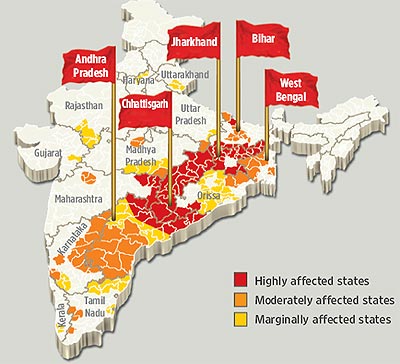
Naxalites have started creating terror with the help of arms in backward or extremely remote parts of the country. How are we going to stop naxalism is the real question. There is no unanimity on this issue among ruling party. In fact, there is criticism against the then Home Minister, P Chidambaram from his own party-men that naxalites were hurt due to his intellectual ego and incidents like Dantewada were taking place.
There was a time when people used to feel lot of sympathy towards naxalism. There was an impression that the naxalites looked after people’s interests living in forests and they tried to get more wage or payment for them for labour. The impression was true. Naxalites were known to teach a lesson to contractors or people who employed the tribal people for collecting ‘tendu’ leaves and exploited them; so also teaching a lesson to government machinery infested with corruption. Their way of doing justice was different. In fact, the government machinery and industrialists were scared of their method of doing justice. Collection of ‘tendu’ leaves (used for rolling beedi)’ got good price and wages. Such hike in wages created ray of hope in their life; but it lasted for few years. Later, the naxalites started exploiting the people living in forests (Vanavasis/ forest-dwellers). The deprived people were kept away from development. When work of constructing roads was undertaken, they created obstacles; when bridge was to be erected, it was destroyed; thus naxalites started to behave in such manner that their act would generate terror among people.
Government support to naxalites !
Naxalites started targeting those, who were helping Government and police, against them (naxalites). They started killing these people not directly but in a manner that would create terror amongst people. On the other hand, police started taking the ‘vanavasis’ to task for helping naxalites. In this manner, exploitation of ‘Vanavasis’ was started from both the sides. Naxalites started to claim that by 2030, democracy in Indiawould be eliminated. Thus, the mild policy adopted by Congress proved to help naxalites. In the meantime, these naxalites got lot of facilities in Andhra Pradesh. These people, who otherwise stayed in interior parts, started coming out in the open; they got protection; they directly reached ‘Raj-Bhavan’; but their terrorism did not end. In fact, it tilted towards more extremity.

Birth of ‘Operation Green Hunt’
Naxalites’ resorting to armed revolution and at the same time, keeping ‘Vanavasis’ under terror led to dispute amongst them. The founders of naxalism were thrown aside and evil leadership like Kisanji came forth. This leadership was cruel even against ‘Vanavasis’. They were of the opinion that even a smallest nail in Government machinery should be pulled out; therefore, attacks on police and Government machinery were undertaken. Cruelty crossed limits so much so that even a pregnant woman was killed just because she was in police department. It was felt at Government level that such attacks should be retaliated; giving birth to ‘Operation Green Hunt’.
Outdated weapons creating adverse effect on soldiers’ mental strength
The purpose of ‘Operation Green Hunt’ was to bend naxalites. They were ready to give reply to armedattacks with arms; but the so-called humanitarians opposed to ‘Operation Green Hunt’. People, who were actually affected by naxalism, were of the view that naxalism should be eradicated. Police force was inadequate for this task because they were not trained to give apt reply to such attacks. The attackers had modern weapons; but police had old weapons which created fear amongst them. As such, police were going for giving apt reply to naxalites; but they used to think that ‘we have come; but let us go back safely’. There was need to have modern weapons and fighting spirit; but our soldiers were getting caught in their nets because of their lack of alertness.
Unity is necessary for preventing naxalism !

For fighting against naxalites, India will have to go beyond party politics and fight with unity of mind and thought and for which unity has to be in true sense of the term.’
– Sudhir Pathak (Ref: ‘Saptahik Vivek’; May 2010)





